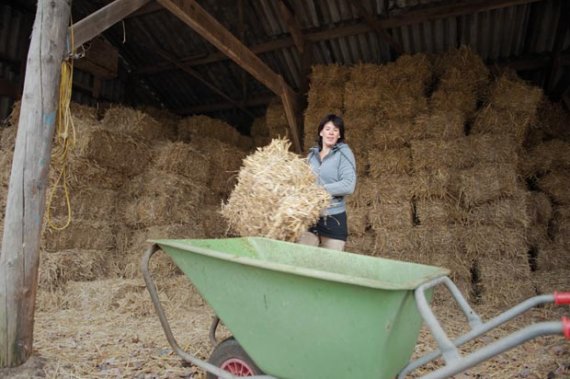Who? Evelyne Wolters-Mulder
What? Part-time student of Forest and Nature Management As well as… Livery stable owner
My husband and I run a livery stable at our home. There are about 40 horses at the moment, ranging from big sports horses to little Shetland ponies. It’s my husband’s hobby; I wasn’t interested in horses. When our daughters took up riding I had lessons too. Now I sometimes drive a horse and carriage. My husband and I help our livery clients when they want to organize an event such as a pony camp or a competition. We have a manager who takes care of the horses. We like being involved with horses, but neither of us are fanatical about it. I started on this degree for practical reasons really. My husband and I live in Groessen. We might have to leave our place there, which creates a lot of uncertainties. Like where we should go and whether we can move the business. I hope that my studies here will help me to decide what to do, because I am learning a lot about the scope and the limitations in the area where we live. So I am not just doing it to get the piece of paper, I thoroughly enjoy the knowledge I gain from it.
Who? Marc Bijlsma
What? Part-time student of Forest and Nature Management As well as… secondary school teacher of Biology
I worked as a lab technician, but I noticed that the contact with patients appealed to me more than analysing blood samples. That’s why I did teacher training and got a job as a biology teacher. What I like best is working with VMBO (pre-vocational secondary school) pupils, because they are so honest and direct. It’s very unpredictable, but if you have the nerve to give them a bit of leeway, you get a lot out of it. That’s lovely.I think that a teacher should have a plan in mind; where are you going yourself? I am afraid that if I keep on doing this for a very long time I will drift further and further away from the subject matter.If I could combine teacher VMBO pupils with nature and environmental education, that would be absolutely great. But I don’t have the knowledge for that yet. To be a teaching forest ranger would be my ideal job.The casual way of working at VHL took a bit of getting used to. It´s sink or swim. That might be a good thing too, because I learn to start investigating things myself. I find the subject matter very interesting indeed. It’s full of juicy bits! It´s great! I do sometimes find it difficult to let go of it and get on with the order of the day.
Who? Paul Penning
What? Part-time student of Land and Water Management As well as… inspector with the Groot Salland water board
I live on a cattle stud farm near Zwolle. The livestock belongs to the neighbour but I run the show when he is away. I start every morning with the heifers. There is also 65 hectares of land on our farm, so in the summer I am kept busy preparing the land, mowing and silaging. I also work for the Groot Salland water board. I mainly inspect and manage waterways such as ditches and canals. I have already noticed the benefits of the degree programme. It gives me much more insight into what I am doing. The reports written for us all come from people at Larenstein. I can recognize material from my classes in them: they are very much landscape-oriented. I hope to be able to use my practical knowledge to balance things out by drawing attention to other aspects, such as the day-to-day practice of water management. That is the added value that part-timers can offer the programme. In the long term I would love to share my knowledge with others as a teacher. You already get a sense that you are given a new status once people hear that you are doing this course. It shouldn’t be like that, but you are approached differently. As someone who has been to university.
Who? Eoin Burke (pronounced Owen)
What? Part-time student of Land and Water Management As well as… fireman
When I was ten I went with my parents from Ireland to Sydney, Australia. I trained as a mountain guide there. During the course of my training I met my Dutch girlfriend. What I liked best about working as a mountain guide was the skills you need in emergency situations. Hanging from a vertical cliff hundreds of meters high, for example, to get someone down safely. That gives you a kick. In the Netherlands I am a fireman. In that work you also learn to use techniques for saving lives in emergencies. That they are sometimes life-threatening situations makes the work all the nicer. I chose this degree programme because I think it’s important for us to use our limited water supply wisely. In Australia most of the rain falls over a very short period, and it’s the same in many parts of the world. The question then is how you can save that water and use it gradually for irrigation. But the programme is not exactly what I expected. I thought we would tackle the problematic issues around water earlier. The language costs me more time than I expected too. I have to read the material three times before I understand it.

